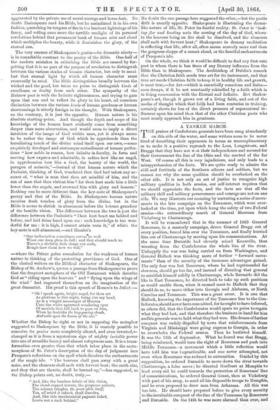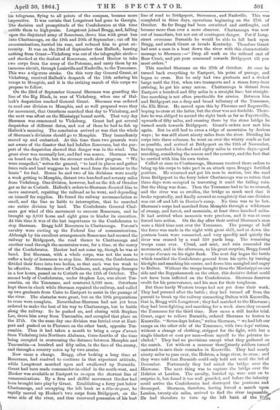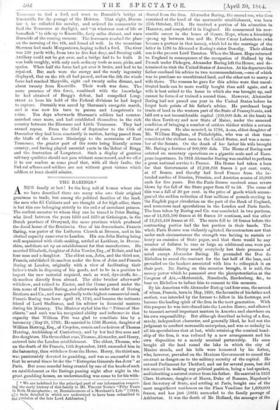A. YANKEE MARCH.
THE praises of Confederate generals have been sung abundantly on this side of the water, and some writers seem to be never tired of describing their opponents in terms so uncomplimentary as to make it a positive reproach to the Lees, Longstreets, and Braggs that they have not won their independence and secured for their Government the line of the Ohio and the control of the far West. Of course all this is very injudicious, and only leads to a misapprehension of the facts. We are quite ready to admire the skill and fortitude of the Southern officers and soldiers, but we cannot see why the same qualities should be overlooked on the other side. It is not only an act of justice to recognize high military qualities in both armies, our self-interest requires that we should appreciate the facts, and the facts are that all the military skill and military perseverance and courage are not on one side. We may illustrate our meaning by narrating a series of move- ments in the late campaign on the Tennessee, which were over- looked at the time, yet upon which hung the safety of two Federal armies—the extraordinary march of General Sherman from Vicksburg to Chattanooga.
It will be remembered that in the summer of 1863 General Rosecrans, in a masterly campaign, drove General Bragg out of every position, forced him over the Tennessee, and finally hurried him out of Chattanooga by moving upon his communications. At the same time Burnside had cleverly seized Knoxville, thus wresting from the Confederates the whole line of the river. Unhappily the war was being carried on from Washington, and General Ilalleck was thinking more of farther " forward move- ments" than of the security of the immense advantages gained. The only fear was lest Rosecrans, whom he had reprimanded for slowness, should go too far, and instead of directing that general to establish himself solidly in Chattanooga, while Burnside did the like in East Tennessee, he directed both to take up such positions as would enable them, when it seemed meet to Halleck that they should do so, to move either into Georgia and Alabama, or North Carolina and Tennessee. This was a great error. It is one that Halleck, knowing the importance of the Tennessee line to the Con- federates, should never have committed, for he ought to have inferred, as others did, that the Confederates would spare no pains to regain what they had lost, and that therefore the business in hand for him andhis generals was to hold what they had won. His dream of farther conquest was rudely dispelled by news that reinforcements from Virginia and Mississippi were going express to Georgia, in order to overwhelm the Federal armies. Then he bestirred himself. It was the 13th of September. What he feared was that Bragg, being reinforced, would turn the right of Rosecrans and push into Middle Tennessee—a movement which a little reflection would have told him was impracticable, and one never attempted, not even when Rosecrans was reduced to extremities. Guided by this supposition, he ordered Burnside to move down the river towards Chattanooga, a false move ; he directed Hurlbmt at Memphis to lend every aid he could towards the protection of Rosecrans' line of communications, he ordered General Grant, then at Vicksburg with part of his army, to send all his disposable troops to Memphis, and he even proposed to draw men from Arkansas. All this was too late. He should have prepared before to give every security to the invaluable conquest of the line of the Tennessee by Rosecrans and Burnside. On the 14th he was more alarmed than ever, and his telegrams, flying to all points of the compass, became more imperative. It was certain that Longstreet had gone to Georgia. The decision and promptitude of the Confederates at this time entitle them to high praise. Longstreet joined Bragg, and, falling upon the disjointed army of Rosecrans, drove him with great loss into Chattanooga, on the 19th and 20th of September; cut off his communications, harried his rear, and reduced him to great ex- tremity. It was on the 23rd of September that Halleck, hearing nothing from Grant—Vicksburg was out of the telegraphic circle— and shocked at the deafest of Rosecrans, ordered Hooker to take two corps from the army of the Potomac, and carry them by an immense circuit, through Louisville and Nashville, to the Tennessee. This was a vigorous stroke. On this very day General Grant, at Vicksburg, received Halleck's despatch of the 13th ordering his troops to Memphis, and it is the striking march of this corps we propose to follow.
On the 23rd of September General Sherman was guarding the line of the Big Black, in rear of Vicksburg, when one of ' Hal- leek's despatches reached General Grant. Sherman was ordered to send one division to Memphis, and so well prepared were they for movement, that Osterhaus marched that day to Vicksburg, and the next was afloat on the Mississippi bound north. That very day Sherman was summoned to Vicksburg. Grant had got several despatches of different dates, and out of these he had to fish up Halleck's meaning. The conclusion arrived at was that the whole of Sherman's divisions should go to Memphis. They immediately moved up and embarked. At this time these two generals were not aware of the disaster that had befallen Rosecrans, but the pur- port of the despatches showed that danger was in the wind. The great river was unusually low, and fuel was scarce. Sherman went on board on the 27th, but the steamer made slow progress. "We were compelled," writes the general, "to land in places and gather fence rails and land waggons to haul wood from the interior to the boats" for fuel. Hence he and two of his divisions were nearly a week getting to Memphis, distant two hundred and seventy miles from Vicksburg. One division, however, had on the 4th of October got as far as Corinth. Halleck's orders to Sherman directed him to move eastward, repairing the railroad as he went, and depending on himself for supplies. He found the railway accommodation so small, and the line so liable to interruption, that he marched one entire division by land. The Confederate General Chal- mers got wind of this movement to succour Rosecrans, and he brought up 3,000 horse and eight guns to hinder its execution. At this time it was of the last importance to the Confederates to stop Sherman. Bragg held Rosecrans in Chattanooga. Forrest's cavalry were cutting up the Federal line of communications. Although by his excellent arrangements Rosecrans had secured the railway to Bridgeport, the road thence to Chattanooga and another road through the mountains were, for a time, at the mercy of the Confederates. Hooker had not come up, though he was at hand. But Sherman, with a whole corps, was not the man to suffer a body of horsemen to stop him. Moreover, the Confederates divided their force into two bodies, so that each was too weak to be effective. Sherman drove off Chalmers, and, repairing damages in a few hours, passed on to Corinth on the 12th of October. The second body of Confederates, under Stephen Lee, was about Tus- cumbia, on the Tennessee, and mustered 5,000 men. Osterhaus kept these in check while Sherman repaired the railway, and called up two gunboats from Cairo to Eastport to assist in the passage of the river. The obstacles were great, but on the 19th preparations to cross were complete. Nevertheless Sherman had not yet been ordered to make the best of his way to Chattanooga, but to battle along the railway. So he pushed on, and closing with Stephen Lee, drove him away from Tuscumbia, and occupied that place on the 27th. On the same day one division was ferried over at East- port and pushed on to Florence on the other bank, opposite Tus- cumbia. Thus it had taken a month to bring a corps d'arinee from Vicksburg into Northern Alabama, three-fourths of the time being occupied in overcoming the distance between Memphis and Tuscumbia—a hundred and fifty miles, in the face of the,enemy, and through a country eaten up by two armies.
Now came a change. Bragg, after looking a long time at Rosecrans, had resolved to continue in that expectant attitude, while Longstreet marched upon and swallowed up Burnside. Grant had been made commander-in-chief in the south-west, and Hooker was available at Eastport to re-open the shortest line of communications. By a firm and skilful movement Hooker had been brought into play by Grant. Establishing a ferry just below Chattanooga, and occupying the left bank as a fete-de-pont, he rapidly moved up Hooker's two corps from Bridgeport, on the same side of the river, and thus recovered possession of his beet line of road to Bridgeport, Stevenson, and Nashville. This was completed in three days, operations beginning on the 27th of October. • So far Bragg had been outwitted and outfought, and became more than ever a mere observer. Chattanooga was now out of immediate, but not out of contingent danger. For if Long. street overcame Burnside he would be able to fall back upon Bragg, and attack Grant or invade Kentucky. Therefore Grant had sent a man in a boat down the river with this characteristic message to Sherman Drop all work on the railroad east of Bear Creek, and put your command towards Bridgeport till you meet orders."
This reached Sherman on the 27th of October. At once he turned back everything to Eastport, his point of passage, and began to cross. But he only had two gunboats and a decked barge until the 31st, when two transports and a steam ferry-boat arriving, he got his army across. Chattanooga is distant from Eastport a hundred and fifty miles in a straight line; but straight- line marching is not often practicable for armies. Between him and Bridgeport ran a deep and broad tributary of the Tennessee, the Elk River. He moved upon this by Florence and Rogersville, hoping to cross at the latter, but the river was not fordable. There- fore he was obliged to ascend the right bank as far as Fayetteville, upwards of fifty miles, and crossing there by the stone bridge he turned south towards Bridgeport. Grant's orders now met him again. But he still had to cross a ridge of mountains by devious ways ; he was still about ninety miles from the river. Dividing his corps into three columns, he went on over the wintry roads as fast as possible, and arrived at Bridgeport on the 13th of November, having marched hundred and eighty miles in twelve days—good marching, considering the season and the country, and the fact that he carried with him his own trains.
Called at once to Chattanooga, Sherman received there orders to bring up his corps to take part in an attack upon Brages fortified position. He returned and got his men in motion, but the road from Bridgeport to the ferry below Chattanooga was so rotten that three days were occupied in traversing it amid the falling rain. But the thing was done. Then the Tennessee had to be re-crossed, and the river was so swollen, the bridge so much used that it broke repeatedly, and finally severed so completely that one division was cut off and left in Hooker's camp. No time was to be lost. Sherman's corps had marched from Memphis through a wilderness of swamp, and forest, and mountain, at least three hundred miles. It had arrived when moments were precious, and it was at once forced into action. On the day after their arrival Sherman's men were a third time sent over the Tennessee. The passage of half the force was made in the night with great skill, and at dawn the pontoon boats were connected, and very speedily and quietly the river was crossed by a road 350 yards long. The remaining troops came over. Cloud, and mist, and rain concealed the movement, and in the afternoon, to his great surprise, Bragg found a corps d'arntee" on his right flank. The next day began the battle which tumbled the Confederate general from his eyrie, by turning his right and smashing his centre, and drove him mangled and angry to Dalton. Without the troops brought from the Mississippi on one side and the Rappahannock on the other, this decisive defeat could not have been inflicted on the Confederates. Sherman deserves credit for his perseverance, and his men for their toughness.
But these hardy Western troops had not yet done their work. They had pursued after the battle ; they had turned off from the pursuit to break up the railway connecting Dalton with Knoxville, that is, Bragg with Longstreet ; they had marched to the Ilia wasse ; they had been fighting and marching for a week since they crossed the Tennessee for the third time. Now came a still harder trial. Grant, eager to relieve Burnside, ordered Sherman to hasten to Knoxville. "Seven days before," writes Sherman, "we had left our camps on the other side of the Tennessee, with two days' rations, without a change of clothing, stripped for the fight, with but a single blanket or coat per man—from myself to the privates in- cluded." They had no provisions except what they gathered on the march. Yet without a murmur theselaturdy soldiers turned eastward to save their comrades in Knoxville. They had nearly ninety miles to pass over, the Holston, a large river, to cross ; and they were told that Burnside could only hold out until the 3rd of
December. Fortunately they had seized the bridge over the Hiawasse. The next thing was to capture the bridge over the
Holston at Loudon. The cavalry, hurried up, were sent on to surprise it, but found it too well guarded, and before the infantry could arrive the Confederates had destroyed the pontoons and decamped. Sherman, therefore, having forced a march upon Loudon, twenty-six miles, arrived to find the river impassable He had therefore to turn up the left bank of the.y. Tennessee to find a ford, and trust to Burnside's bridge at Knoxsville for the passage of the Holston. That night, Decem- ber 2, he collected his cavalry, and ordered its commander to ford the Tennessee at daylight, and "at whatever cost of life or horseflesh" to ride up to Knoxville, forty miles distant, and warn Burnside of the coming succour. The horsemen reached the place on the morning of the 4th, and found all well. In the meantime Sherman had made Morgantown, hoping to find a ford. The river was 250 yards wide, from two to five feet deep, and freezing cold. Artillery could not be got over, and a bridge had to be built. It was built roughly, with only such ordinary tools as axes, picks, and spades. When half the force had got over it broke, and had to be repaired. But such were the energy and the ready ingenuity displayed, that on the 4th all had passed, and on the 5th the whole force had reached Maryville, eight and twenty miles distant, and about twenty from Knoxville. Their work was done. The mere presence of this force, combined with the knowledge he had obtained of Bragg's defeat, had compelled Long- street to loose his hold of the Federal divisions he had hoped to capture. Burnside was saved by Sherman's energetic march, and it was now his turn to pursue and Longstreet's to retire. Ten days afterwards Sherman's soldiers had counter- marched once more, and had established themselves in the rich country between the Hiawasse and Little Tennessee. They had earned repose. From the 23rd of September to the 15th of December they had been constantly in motion, having passed from the bluffs of the Lower Mississippi to the mountains of East Tennessee, the greater part of the route being literally across country, and having played essential parts in thedefeat of Bragg and the frustration of Longstreet. Such a display of genuine military qualities should not pass without some record, and we offer it to our readers as some proof that, with all their faults, the Federal officers and soldiers are not without great virtues which soldiers at least should admire.




































 Previous page
Previous page